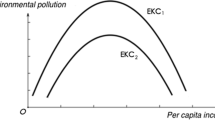Abstract
The increase in environmental degradation has rapidly enhanced the interest in the main determinants of CO2 emissions. Although many attempts have been exerted to discover the determinants of CO2 emissions, the impact of natural resources (NAT), which have significant environmental impacts on CO2 emissions, has been considerably neglected. To fulfill this gap in the literature, the study analyzes the impact of NAT on CO2 emissions covering the period 1975–2017 in Turkey. In addition, economic growth, renewable energy consumption, trade openness, and energy consumption are added in the model as explanatory variables. Findings from ARDL, FMOLS, and DOLS estimators indicate that the abundance of NAT is an important catalyst in reducing CO2 emissions. The results denote that the EKC is valid in Turkey. Furthermore, although the total energy consumption enhances CO2 emission, renewable energy reduces it. Thus, the increased use of NAT is important to improve the environmental quality in Turkey.



Similar content being viewed by others
References
Ali R, Bakhsh K, Yasin MA (2019) Impact of urbanization on CO2 emissions in emerging economy: evidence from Pakistan. Sustain Cities Soc 48:1–6
Apergis N, Ozturk I (2015) Testing environmental Kuznets curve hypothesis in Asian countries. Ecol Indic 52:16–22
Apergis N, Payne JE (2009) CO2 emissions, energy usage, and output in Central America. Energy Policy 37(8):3282–3286
Arouri MEH, Youssef AB, M'henni H, Rault C (2012) Energy consumption, economic growth and CO2 emissions in Middle East and North African countries. Energy Policy 45:342–349
Balsalobre-Lorente D, Shahbaz M, Roubaud D, Farhani S (2018) How economic growth, renewable electricity and natural resources contribute to CO2 emissions? Energy Policy 113:356–367
Bayer C, Hanck C (2013) Combining non-cointegration tests. J Time Ser Anal 34(1):83–95
Boluk G, Mert M (2015) The renewable energy, growth and environmental Kuznets curve in Turkey: an ARDL approach. Renew Sust Energ Rev 52:587–595
BP (2020) BP Statistical Review of World Energy. https://www.bp.com/en/global/corporate/energy-economics/statistical-review-of-world-energy.html. Accessed: 23 July 2020
Danish MAB, Mahmood N, Zhang JW (2019) Effect of natural resources, renewable energy and economic development on CO2 emissions in BRICS countries. Sci Total Environ 678:632–638
Dickey D, Fuller WA (1981) Likelihood ratio statistics for autoregressive time series with a unit root. Econometrica 49:1057–1072
Dogan E, Seker F (2016) Determinants of CO2 emissions in the European Union: the role of renewable and non-renewable energy. Renew Energy 94:429–439
Eyuboglu K, Uzar U (2020) The impact of tourism on CO2 emission in Turkey. Curr Issue Tour 23(13):1631–1645
Gokmenoglu KK, Sadeghieh M (2019) Financial development, CO2 emissions, fossil fuel consumption and economic growth: the case of Turkey. Strat Plan Energy Environ 38(4):7–28
Grossman GM, Krueger AB (1991) Environmental impacts of a North American free trade agreement (no. w3914). National Bureau of Economic Research. Accessed: 13 January 2020
Halicioglu F (2009) An econometric study of CO2 emissions, energy consumption, income and foreign trade in Turkey. Energy Policy 37(3):1156–1164
Hassan ST, Xia E, Khan NH, Shah SMA (2019) Economic growth, natural resources, and ecological footprints: evidence from Pakistan. Environ Sci Pollut Res 26(3):2929–2938
Katircioglu S, Katircioglu S, Saqib N (2020a) Does higher education system moderate energy consumption and climate change nexus? Evidence from a small island. Air Qual Atmos Health 13(2):153–160
Katircioglu S, Saqib N, Katircioglu S, Kilinc CC, Gul H (2020b) Estimating the effects of tourism growth on emission pollutants: empirical evidence from a small island, Cyprus. Air Qual Atmos Health 13:391–397
Kuznets S (1955) Economic growth and income inequality. Am Econ Rev 45(1):1–28
Narayan PK (2005) The saving and investment nexus for China: evidence from cointegration tests. Appl Econ 37(17):1979–1990
Narayan PK, Smyth R (2006) What determines migration flows from low-income to high-income countries? An empirical investigation of Fiji-US migration 1972-2001. Contemp Econ Policy 24:332–342
Ocal O, Aslan A (2013) Renewable energy consumption–economic growth nexus in Turkey. Renew Sust Energ Rev 28:494–499
Pesaran MH, Shin Y, Smith R (2001) Bounds testing approaches to the analysis of level relationships. J Appl Econ 16:289–326
Rehman A, Ma H, Ozturk I (2020) Decoupling the climatic and carbon dioxide emission influence to maize crop production in Pakistan. Air Qual Atmos Health 13:695–707
Renewables Global Status Report (2019) http://www.ren21.net/gsr-2019/pages/foreword/foreword/. Accessed: 23 January 2020
Sarkodie SA, Strezov V, Weldekidan H, Asamoah EF, Owusu PA, Doyi INY (2019) Environmental sustainability assessment using dynamic autoregressive-distributed lag simulations-nexus between greenhouse gas emissions, biomass energy, food and economic growth. Sci Total Environ 668:318–332
Seker F, Ertugrul HM, Cetin M (2015) The impact of foreign direct investment on environmental quality: a bounds testing and causality analysis for Turkey. Renew Sust Energ Rev 52:347–356
Shahbaz M, Tiwari AK, Nasir M (2013) The effects of financial development, economic growth, coal consumption and trade openness on CO2 emissions in South Africa. Energy Policy 61:1452–1459
Uzar U, Eyuboglu K (2019a) The nexus between income inequality and CO2 emissions in Turkey. J Clean Prod 227:149–157
Uzar U, Eyuboglu K (2019b) Is foreign direct investment an engine for energy consumption? An empirical investigation for Turkey. Environ Sci Pollut Res 26(27):28092–28105
Uzuner G, Saint Akadiri S, Lasisi TT (2020) The asymmetric relationship between globalization, tourism, CO2 emissions, and economic growth in Turkey: implications for environmental policy making. Environ Sci Pollut Res Int 27:32742–32753. https://doi.org/10.1007/s11356-020-09190-5
Wang H, Zhang X (2020) Spatial heterogeneity of factors influencing transportation CO2 emissions in Chinese cities: based on geographically weighted regression model. Air Qual Atmos Health 13:1–13. https://doi.org/10.1007/s11869-020-00854-2
World Development Indicators (2020) The World Bank. http://databank.worldbank.org/data/source/world-development-indicators. Accessed: 11 January 2020
Yang B, Ali M, Nazir MR, Ullah W, Qayyum M (2020) Financial instability and CO2 emissions: cross-country evidence. Air Qual Atmos Health 13:459–468
Author information
Authors and Affiliations
Corresponding author
Additional information
Publisher’s note
Springer Nature remains neutral with regard to jurisdictional claims in published maps and institutional affiliations.
Rights and permissions
About this article
Cite this article
Uzar, U., Eyuboglu, K. Do natural resources heal the environment? Empirical evidence from Turkey. Air Qual Atmos Health 14, 37–46 (2021). https://doi.org/10.1007/s11869-020-00911-w
Received:
Accepted:
Published:
Issue Date:
DOI: https://doi.org/10.1007/s11869-020-00911-w




